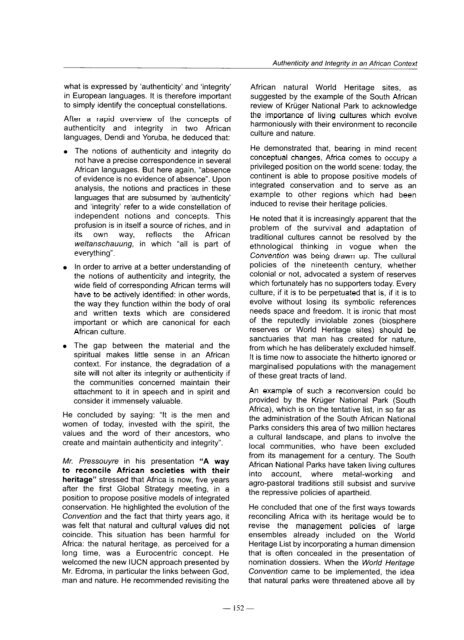Mul - unesdoc - Unesco
Mul - unesdoc - Unesco
Mul - unesdoc - Unesco
Create successful ePaper yourself
Turn your PDF publications into a flip-book with our unique Google optimized e-Paper software.
what is expressed by ‘authenticity’ and ‘integrity’<br />
in European languages. It is therefore important<br />
to simply identify the conceptual constellations.<br />
After a rapid overview of the concepts of<br />
authenticity and integrity in two African<br />
languages, Dendi and Yoruba, he deduced that:<br />
The notions of authenticity and integrity do<br />
not have a precise correspondence in several<br />
African languages. But here again, “absence<br />
of evidence is no evidence of absence”. Upon<br />
analysis, the notions and practices in these<br />
languages that are subsumed by ‘authenticity’<br />
and ‘integrity’ refer to a wide constellation of<br />
independent notions and concepts. This<br />
profusion is in itself a source of riches, and in<br />
its own way, reflects the African<br />
weltanschauung, in which “all is part of<br />
everything”.<br />
In order to arrive at a better understanding of<br />
the notions of authenticity and integrity, the<br />
wide field of corresponding African terms Will<br />
have to be actively identified: in other words,<br />
the way they function within the body of oral<br />
and written texts which are considered<br />
important or which are canonical for each<br />
African culture.<br />
The gap between the material and the<br />
spiritual makes little sense in an African<br />
context. For instance, the degradation of a<br />
site Will not alter its integrity or authenticity if<br />
the communities concerned maintain their<br />
attachment to it in speech and in spirit and<br />
consider it immensely valuable.<br />
He concluded by saying: “lt is the men and<br />
women of today, invested with the spirit, the<br />
values and the Word of their ancestors, who<br />
create and maintain authenticity and integrity”.<br />
Mr, Pressouyre in his presentation “A way<br />
to reconcile African societies with their<br />
heritage” stressed that Africa is now, five years<br />
after the first Global Strategy meeting, in a<br />
position to propose positive models of integrated<br />
conservation. He highlighted the evolution of the<br />
Convention and the fact that thirty years ago, it<br />
was felt that natural and cultural values did not<br />
coincide. This situation has been harmful for<br />
Africa: the natural heritage, as perceived for a<br />
long time, was a Eurocentric concept. He<br />
welcomed the new IUCN approach presented by<br />
Mr. Edroma, in particular the links between God,<br />
man and nature. He recommended revisiting the<br />
- 152 -<br />
Authenticity and lntegrity in an African Context<br />
African natural World Heritage sites, as<br />
suggested by the example of the South African<br />
review of Krüger National Park to acknowledge<br />
the importance of living cultures which evolve<br />
harmoniously with their environment to reconcile<br />
culture and nature.<br />
He demonstrated that, bearing in mind recent<br />
conceptual changes, Africa cornes to occupy a<br />
privileged position on the world scene: today, the<br />
continent is able to propose positive models of<br />
integrated conservation and to serve as an<br />
example to other regions which had been<br />
induced to revise their heritage policies.<br />
He noted that it is increasingly apparent that the<br />
problem of the survival and adaptation of<br />
traditional cultures cannot be resolved by the<br />
ethnological thinking in vogue when the<br />
Convention was being drawn up. The cultural<br />
policies of the nineteenth Century, whether<br />
colonial or not, advocated a system of reserves<br />
which fortunately has no supporters today. Every<br />
culture, if it is to be perpetuated that is, if it is to<br />
evolve without losing its symbolic references<br />
needs space and freedom. It is ironie that most<br />
of the reputedly inviolable zones (biosphere<br />
reserves or World Heritage sites) should be<br />
sanctuaries that man has created for nature,<br />
from which he has deliberately excluded himself.<br />
It is time now to associate the hitherto ignored or<br />
marginalised populations with the management<br />
of these great tracts of land.<br />
An example of such a reconversion could be<br />
provided by the Krüger National Park (South<br />
Africa), which is on the tentative list, in SO far as<br />
the administration of the South African National<br />
Parks considers this area of two million hectares<br />
a cultural landscape, and plans to involve the<br />
local communities, who have been excluded<br />
from its management for a Century. The South<br />
African National Parks have taken living cultures<br />
into account, where metal-working and<br />
agro-pastoral traditions still subsist and survive<br />
the repressive policies of apartheid.<br />
He concluded that one of the first ways towards<br />
reconciling Africa with its heritage would be to<br />
revise the management policies of large<br />
ensembles already included on the World<br />
Heritage List by incorporating a human dimension<br />
that is often concealed in the presentation of<br />
nomination dossiers. When the World Heritage<br />
Convention came to be implemented, the idea<br />
that natural parks were threatened above all by

















